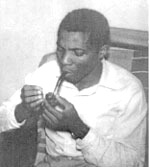Christopher Okigbo
| Chris Okigbo | |
|---|---|

Christopher Okigbo
|
|
| Born | Christopher Ifekandu Okigbo 16 August 1932 Ojoto, Anambra State, Nigeria |
| Died | 1967 Nsukka, Igboland |
| Occupation | Author, Poet |
| Nationality | Nigerian |
| Ethnicity | Igbo |
| Genre | Drama, poetry |
| Subject | Comparative literature |
Christopher Ifekandu Okigbo (16 August 1932–1967) was a Nigerian poet, teacher, and librarian, who died fighting for the independence of Biafra. He is today widely acknowledged as an outstanding postcolonial English-language African poet and one of the major modernist writers of the 20th century.
Okigbo was born on 16 August 1932, in the town of Ojoto, about 10 miles (16 km) from the city of Onitsha in Anambra State. His father was a teacher in Catholic missionary schools during the heyday of British colonial rule in Nigeria, and Okigbo spent his early years moving from station to station. Despite his father's devout Christianity, Okigbo had an affinity, and came to believe later in his life, that in him was reincarnated the soul of his maternal grandfather, a priest of Idoto, an Igbo deity. Idoto is personified in the river of the same name that flows through Okigbo's village, and the "water goddess" figures prominently in his work. Heavensgate (1962) opens with the lines:
while in "Distances" (1964), he celebrates his final aesthetic and psychic return to his indigenous religious roots:
Another influential figure in Okigbo's early years was his older brother Pius Okigbo, who would later become the renowned economist and first Nigerian Ambassador to the European Economic Commission (EU).
Okigbo graduated from Government College Umuahia (in present Abia State, Nigeria) two years after Chinua Achebe, another noted Nigerian writer, having earned himself a reputation as both a voracious reader and a versatile athlete. The following year, he was accepted to University College in Ibadan. Originally intending to study Medicine, he switched to Classics in his second year. In college, he also earned a reputation as a gifted pianist, accompanying Wole Soyinka in his first public appearance as a singer. It is believed that Okigbo also wrote original music at that time, though none of this has survived.
Upon graduating in 1956, he held a succession of jobs in various locations throughout the country, while making his first forays into poetry. He worked at the Nigerian Tobacco Company, United Africa Company, the Fiditi Grammar School (where he taught Latin), and finally as Assistant Librarian at the University of Nigeria in Nsukka, where he helped to found the African Authors Association.
...
Wikipedia
